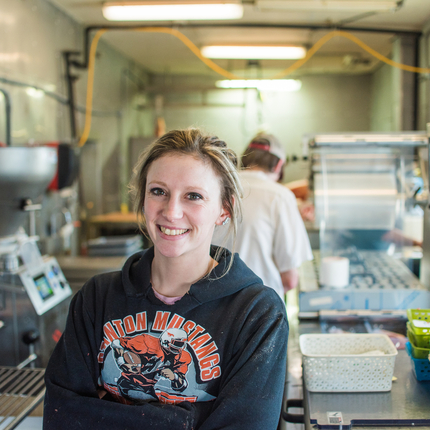Published in the Omaha World-Herald on March 24, 2021
By Anna Zeleny, Oakland (Nebraska) Processing Plant
As the operator of a small local meat locker, I find that the goal of our day-to-day work is not to get our product to a big-box grocery store customer. Instead, we do our best to create a quality food that our neighbors, family, friends and farmers can be proud of.
When the COVID-19 pandemic hit, large-scale beef and pork producers turned to facilities like ours in Oakland, Neb., to fill the void as regional plants reduced or paused production. This created a debilitating bottleneck that left family farms who rely on direct sales without a crucial partner. Our longtime customers, who could typically schedule locker dates four to six weeks in advance, are now having to schedule them more than one year before the animal is even born.
Like any small business, we welcome this activity. We show up every day to meet the challenge. Unfortunately, we have found financial hurdles and regulatory barriers standing in our way.
Legislative Bill 324, introduced by Sen. Tom Brandt, will help our small business clear those obstacles. It creates the Independent Processor Assistance Program, giving us a roadmap to increase processing capacity and expand market access. Big banks are not familiar with a local locker’s business model and are reluctant to make these loans. That is why 17 neighboring states developed a program of their own. The Independent Processor Assistance Program can provide access to the capital we need to construct new buildings, implement efficient technology, improve our processing and storage equipment, and provide education or workforce programs to train and recruit new workers.
LB 324 also provides a framework that will make it easier for consumers to purchase meat directly from the producer. Before, this option was available only to those who could afford a whole side of beef or were fortunate enough to live near one of the several USDA facilities licensed in the state. The herd share program outlined in this bill will make it possible for the consumer to purchase only the cuts of meat they like from a local producer they know. It utilizes dozens of high-quality custom exempt lockers in Nebraska to give consumers options that fit their budget. Because we have our own small herd of cattle, this is a provision we can implement right away.
Last spring, just as the pandemic began to take root, a herd-share program was successfully implemented in Wyoming. That bill removed unnecessary barriers to allow the free market to operate, and several operators have taken advantage. I believe a similar program would be just as successful here in Nebraska.
Like the Wyoming program, ours was written and revised to comply with USDA and Food Safety Inspection Service regulations. It is absolutely essential that the producer and the processor strictly adhere to this federal guidance, and the bill provides an outline to help them do just that. Importantly, the bill also maintains the high-quality sanitation standards all Nebraska meat lockers are subject to. The Nebraska Department of Agriculture will continue its role of making sure our facilities are clean and the end product is up to standard.
The COVID-19 pandemic has tested and challenged all of us. The provisions in LB 324 will allow small processors to grow our businesses and create jobs and activity on our main streets. We simply cannot afford to miss this opportunity, so I’m urging the Legislature to support our state’s small meat processors, producers and customers by continuing to advance LB 324.
Feature photo: Anna Zeleny is pictured at the Oakland (Nebraska) Processing Plant. | Photo by Kylie Kai





